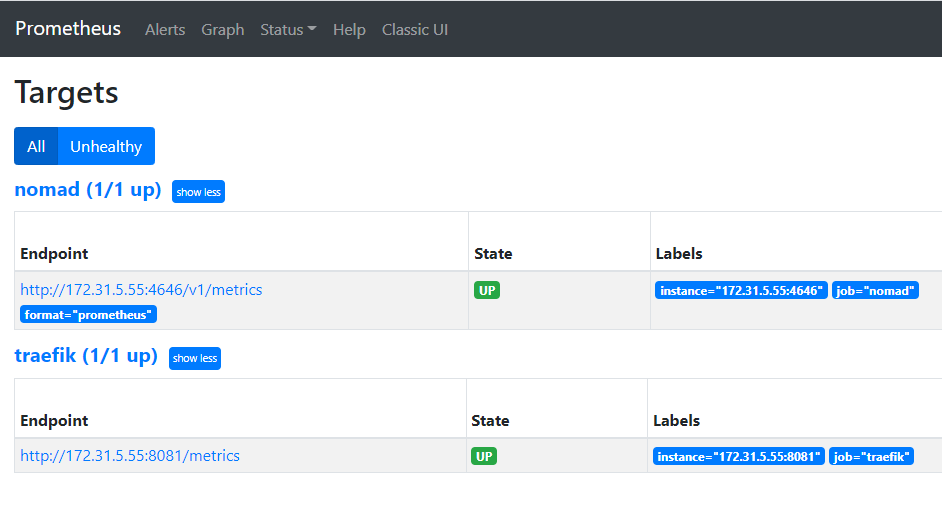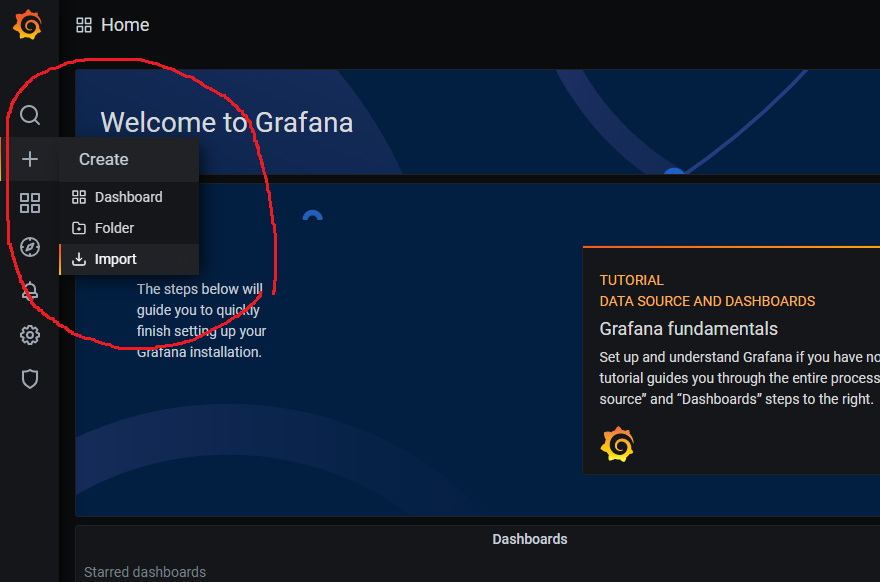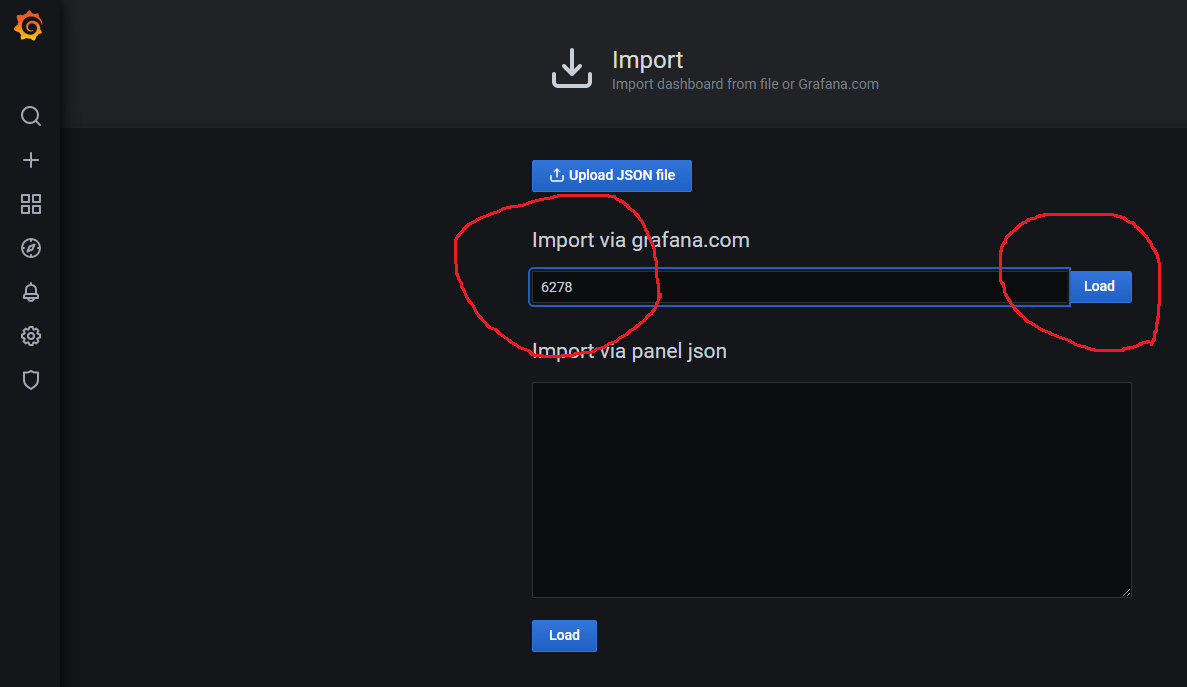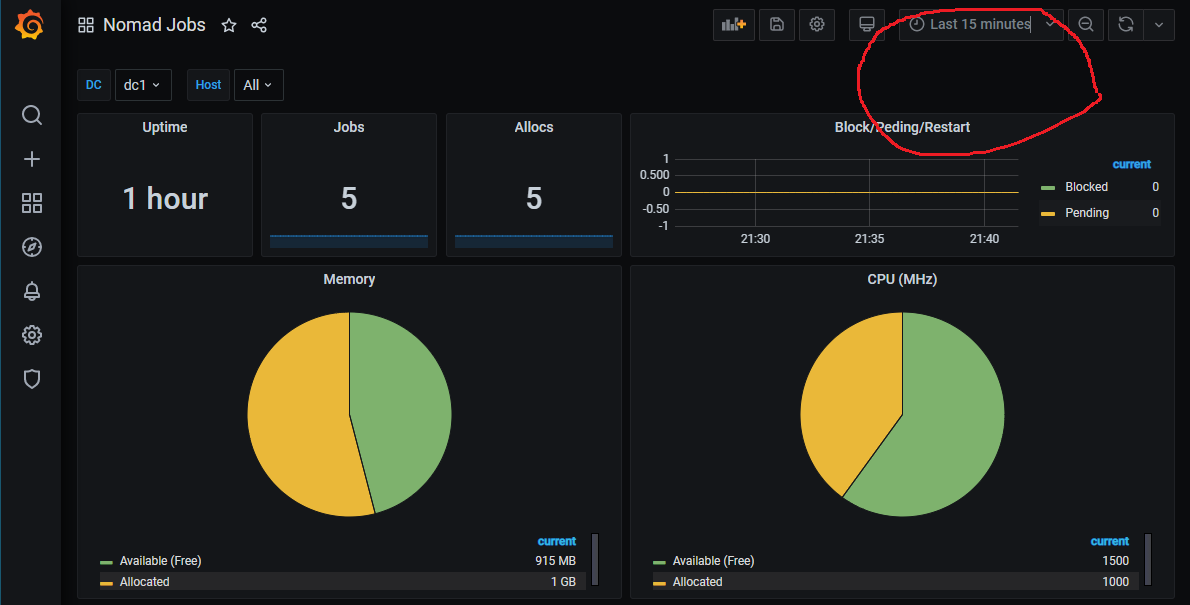Table of Contents
nomad autoscaler 가지고 놀기
목표
nomad autoscaler 를 이용해 Auto Scaling 을 작동시킵니다.
준비물 설치
AWS AMI 인스턴스를 생성합니다.
메모리는 2G 로 합니다.
JDK, Docker 를 설치합니다.
sudo yum install java-11-amazon-corretto-headless -y
java -versionsudo yum install docker -y
docker -v
sudo service docker start
sudo systemctl enable docker.serviceConsul 설치
sudo mkdir -p /etc/consul.d
sudo mkdir -p /opt/consul
sudo vi /etc/consul.d/consul.hcl
-----------------------------------------
datacenter = "dc1"
advertise_addr = "127.0.0.1"
client_addr = "0.0.0.0"
data_dir = "/opt/consul"
server = true
bootstrap_expect = 1
ui = true
telemetry {
prometheus_retention_time = "30s"
}
-----------------------------------------sudo docker run -d --name consul \
-p 8500:8500 -p 8600:8600 -p 8600:8600/udp \
-v /opt/consul:/opt/consul \
-v /etc/consul.d:/etc/consul.d \
--net host \
--restart=always \
consul:1.4.2Nomad 설치
아래 명령으로 nomad 를 설치해 줍니다.
wget https://releases.hashicorp.com/nomad/1.1.3/nomad_1.1.3_linux_amd64.zip
unzip nomad_1.1.3_linux_amd64.zip
sudo mv nomad /usr/bin/
nomad version테스트용이므로, 한 서버에 Server/Client 를 한번에 활성화 합니다.
sudo mkdir -p /etc/nomad.d
sudo mkdir -p /opt/nomad
sudo vi /etc/nomad.d/nomad.hcl
-----------------------------------------
datacenter = "dc1"
data_dir = "/opt/nomad/data"
bind_addr = "0.0.0.0"
advertise {
http = "{{ GetPrivateIP }}"
rpc = "{{ GetPrivateIP }}"
serf = "{{ GetPrivateIP }}"
}
server {
enabled = true
bootstrap_expect = 1
}
client {
enabled = true
host_volume "grafana" {
# add directory manually
# sudo mkdir -p /opt/nomad-volumes/grafana
# sudo chown 472:472 /opt/nomad-volumes/grafana
path = "/opt/nomad-volumes/grafana"
}
}
# plugin "nvidia-gpu" {
# config {
# enabled = true
# ignored_gpu_ids = ["GPU-fef8089b", "GPU-ac81e44d"]
# fingerprint_period = "1m"
# }
# }
plugin "docker" {
config {
volumes {
enabled = true
}
}
}
telemetry {
publish_allocation_metrics = true
publish_node_metrics = true
prometheus_metrics = true
}
-----------------------------------------grafana 용 볼륨 생성
sudo mkdir -p /opt/nomad-volumes/grafana
sudo chown 472:472 /opt/nomad-volumes/grafananomad client 는 root 권한이 필요합니다.
sudo nomad agent -config=/etc/nomad.d/nomad.hclnomad 서비스로 실행하기
sudo vi /lib/systemd/system/nomad.service
---------------------------
[Unit]
Description=Nomad
Documentation=https://nomadproject.io/docs/
Wants=network-online.target
After=network-online.target
# When using Nomad with Consul it is not necessary to start Consul first. These
# lines start Consul before Nomad as an optimization to avoid Nomad logging
# that Consul is unavailable at startup.
#Wants=consul.service
#After=consul.service
[Service]
ExecReload=/bin/kill -HUP $MAINPID
ExecStart=/usr/bin/nomad agent -config /etc/nomad.d
KillMode=process
KillSignal=SIGINT
LimitNOFILE=65536
LimitNPROC=infinity
Restart=on-failure
RestartSec=2
StartLimitBurst=3
StartLimitIntervalSec=10
TasksMax=infinity
OOMScoreAdjust=-1000
[Install]
WantedBy=multi-user.target
---------------------------sudo systemctl daemon-reload
sudo systemctl enable nomad
sudo systemctl start nomad
sudo systemctl status nomadTraefik 설치
Traefik 이 CPU 과다 사용 이슈가 있어 HAproxy 로 변경합니다.
Reverse Proxy 를 위해 traefik 을 설치합니다.
vi traefik.nomad
------------------------------
job "traefik" {
region = "global"
datacenters = ["dc1"]
type = "system"
group "traefik" {
count = 1
network {
# traefik web ui
port "api" {
static = 8081
}
port "grafana" {
static = 3000
}
port "prometheus" {
static = 9090
}
port "http" {
static = 8080
}
}
task "traefik" {
driver = "docker"
config {
image = "traefik:v2.4"
ports = ["api", "grafana", "prometheus", "http"]
# Use `host` network so we can communicate with the Consul agent
# running in the host to access the service catalog.
network_mode = "host"
volumes = [
"local/traefik.toml:/etc/traefik/traefik.toml",
]
}
template {
data = <<EOF
[entryPoints]
[entryPoints.traefik]
address = ":{{ env "NOMAD_PORT_api" }}"
[entryPoints.grafana]
address = ":{{ env "NOMAD_PORT_grafana" }}"
[entryPoints.prometheus]
address = ":{{ env "NOMAD_PORT_prometheus" }}"
[entryPoints.http]
address = ":{{ env "NOMAD_PORT_http" }}"
[api]
dashboard = true
insecure = true
[metrics]
[metrics.prometheus]
addServicesLabels = true
# Enable Consul Catalog configuration backend.
[providers.consulCatalog]
prefix = "traefik"
exposedByDefault = false
[providers.consulCatalog.endpoint]
address = "127.0.0.1:8500"
scheme = "http"
EOF
destination = "local/traefik.toml"
}
resources {
cpu = 200
memory = 256
}
service {
name = "traefik-api"
port = "api"
address_mode = "host"
check {
name = "alive"
type = "tcp"
port = "api"
interval = "10s"
timeout = "2s"
}
}
service {
name = "traefik-http"
port = "http"
address_mode = "host"
check {
name = "alive"
type = "tcp"
port = "http"
interval = "10s"
timeout = "2s"
}
}
service {
name = "traefik-grafana"
port = "grafana"
address_mode = "host"
check {
name = "alive"
type = "tcp"
port = "grafana"
interval = "10s"
timeout = "2s"
}
}
service {
name = "traefik-prometheus"
port = "prometheus"
address_mode = "host"
check {
name = "alive"
type = "tcp"
port = "prometheus"
interval = "10s"
timeout = "2s"
}
}
}
}
}
------------------------------nomad run traefik.nomadHAproxy 설정
앱의 DNS 만 매칭해 주면 됩니다.
대소문자는 구분하지 않습니다.
_<앱의 서비스명>._tcp.service.consul
vi haproxy.nomad
------------------------------
job "haproxy" {
datacenters = ["dc1"]
group "haproxy" {
count = 1
network {
port "webapp" {
static = 8080
}
port "prometheus_ui" {
static = 9090
}
port "grafana_ui" {
static = 3000
}
port "haproxy_ui" {
static = 4936
}
port "haproxy_exporter" {}
}
task "haproxy" {
driver = "docker"
config {
image = "haproxy:2.3.5"
ports = ["webapp", "haproxy_ui"]
# Use `host` network so we can communicate with the Consul agent
# running in the host to access the service catalog.
network_mode = "host"
volumes = [
"local/haproxy.cfg:/usr/local/etc/haproxy/haproxy.cfg",
]
}
template {
data = <<EOF
global
maxconn 8192
defaults
mode http
timeout client 10s
timeout connect 5s
timeout server 10s
timeout http-request 10s
frontend stats
bind *:{{ env "NOMAD_PORT_haproxy_ui" }}
stats uri /
stats show-legends
no log
frontend http_front
bind *:{{ env "NOMAD_PORT_webapp" }}
default_backend http_back
frontend prometheus_ui_front
bind *:{{ env "NOMAD_PORT_prometheus_ui" }}
default_backend prometheus_ui_back
frontend grafana_ui_front
bind *:{{ env "NOMAD_PORT_grafana_ui" }}
default_backend grafana_ui_back
backend http_back
balance roundrobin
server-template webapp 20 _helloservice._tcp.service.consul resolvers consul resolve-opts allow-dup-ip resolve-prefer ipv4 check
backend prometheus_ui_back
balance roundrobin
server-template prometheus_ui 5 _prometheus._tcp.service.consul resolvers consul resolve-opts allow-dup-ip resolve-prefer ipv4 check
backend grafana_ui_back
balance roundrobin
server-template grafana 5 _grafana._tcp.service.consul resolvers consul resolve-opts allow-dup-ip resolve-prefer ipv4 check
resolvers consul
nameserver consul {{ env "attr.unique.network.ip-address" }}:8600
accepted_payload_size 8192
hold valid 5s
EOF
destination = "local/haproxy.cfg"
change_mode = "signal"
change_signal = "SIGUSR1"
}
resources {
cpu = 500
memory = 128
}
service {
name = "haproxy-ui"
port = "haproxy_ui"
check {
type = "http"
path = "/"
interval = "10s"
timeout = "2s"
}
}
service {
name = "haproxy-webapp"
port = "webapp"
}
}
task "haproxy-exporter" {
driver = "docker"
lifecycle {
hook = "prestart"
sidecar = true
}
config {
image = "prom/haproxy-exporter:v0.10.0"
ports = ["haproxy_exporter"]
network_mode = "host"
args = [
"--web.listen-address",
":${NOMAD_PORT_haproxy_exporter}",
"--haproxy.scrape-uri",
"http://${NOMAD_ADDR_haproxy_ui}/?stats;csv",
]
}
resources {
cpu = 100
memory = 32
}
service {
name = "haproxy-exporter"
port = "haproxy_exporter"
check {
type = "http"
path = "/metrics"
interval = "10s"
timeout = "2s"
}
}
}
}
}
------------------------------nomad run haproxy.nomadPrometheus 설정
vi prometheus.nomad
------------------------------
job "prometheus" {
datacenters = ["dc1"]
group "prometheus" {
count = 1
network {
port "prometheus_ui" {}
}
task "prometheus" {
driver = "docker"
config {
image = "prom/prometheus:v2.25.0"
ports = ["prometheus_ui"]
network_mode = "host"
args = [
"--config.file=/etc/prometheus/config/prometheus.yml",
"--storage.tsdb.path=/prometheus",
"--web.listen-address=0.0.0.0:${NOMAD_PORT_prometheus_ui}",
"--web.console.libraries=/usr/share/prometheus/console_libraries",
"--web.console.templates=/usr/share/prometheus/consoles",
]
volumes = [
"local/config:/etc/prometheus/config",
]
}
template {
data = <<EOH
---
global:
scrape_interval: 1s
evaluation_interval: 1s
scrape_configs:
- job_name: haproxy_exporter
static_configs:
- targets: [{{ range service "haproxy-exporter" }}'{{ .Address }}:{{ .Port }}',{{ end }}]
- job_name: nomad_autoscaler
metrics_path: /v1/metrics
params:
format: ['prometheus']
static_configs:
- targets: [{{ range service "autoscaler" }}'{{ .Address }}:{{ .Port }}',{{ end }}]
- job_name: nomad
metrics_path: /v1/metrics
params:
format: ['prometheus']
static_configs:
- targets: ['{{ env "attr.unique.network.ip-address" }}:4646']
EOH
change_mode = "signal"
change_signal = "SIGHUP"
destination = "local/config/prometheus.yml"
}
resources {
cpu = 100
memory = 256
}
service {
name = "prometheus"
port = "prometheus_ui"
check {
type = "http"
path = "/-/healthy"
interval = "10s"
timeout = "2s"
}
}
}
}
}
------------------------------nomad run prometheus.nomadhttp://<인스턴스 퍼블릭 아이피>:9090/targets 를 이용해 접속 상태를 확인할 수 있습니다.
Grafana 설정
vi grafana.nomad
-----------------------------------------
job "grafana" {
datacenters = ["dc1"]
group "grafana" {
count = 1
network {
port "grafana_ui" {}
}
volume "grafana" {
type = "host"
source = "grafana"
}
task "grafana" {
driver = "docker"
config {
image = "grafana/grafana:7.4.2"
ports = ["grafana_ui"]
network_mode = "host"
volumes = [
"local/datasources:/etc/grafana/provisioning/datasources",
"local/dashboards:/etc/grafana/provisioning/dashboards",
"/home/vagrant/nomad-autoscaler/files:/var/lib/grafana/dashboards",
]
}
env {
GF_INSTALL_PLUGINS = "grafana-clock-panel,grafana-piechart-panel,natel-discrete-panel"
GF_AUTH_ANONYMOUS_ENABLED = "true"
GF_AUTH_ANONYMOUS_ORG_ROLE = "Editor"
GF_SERVER_HTTP_PORT = "${NOMAD_PORT_grafana_ui}"
}
template {
data = <<EOH
apiVersion: 1
datasources:
- name: Prometheus
type: prometheus
access: proxy
url: http://{{ range $i, $s := service "prometheus" }}{{ if eq $i 0 }}{{.Address}}:{{.Port}}{{end}}{{end}}
isDefault: true
version: 1
editable: false
EOH
destination = "local/datasources/prometheus.yaml"
}
template {
data = <<EOH
apiVersion: 1
providers:
- name: Nomad Autoscaler
folder: Nomad
folderUid: nomad
type: file
disableDeletion: true
editable: false
allowUiUpdates: false
options:
path: /var/lib/grafana/dashboards
EOH
destination = "local/dashboards/nomad-autoscaler.yaml"
}
volume_mount {
volume = "grafana"
destination = "/var/lib/grafana"
}
resources {
cpu = 100
memory = 64
}
service {
name = "grafana"
port = "grafana_ui"
check {
type = "http"
path = "/api/health"
interval = "10s"
timeout = "2s"
}
}
}
}
}
-----------------------------------------nomad run grafana.nomad환경변수 GF_INSTALL_PLUGINS 을 이용해 grafana 플러그인을 설치할 수 있습니다.
Autoscaler 생성
vi autoscaler.nomad
-----------------------------------------
job "autoscaler" {
datacenters = ["dc1"]
group "autoscaler" {
count = 1
task "autoscaler" {
driver = "docker"
config {
image = "hashicorp/nomad-autoscaler:0.3.3"
command = "nomad-autoscaler"
network_mode = "host"
args = ["agent", "-http-bind-port=8090", "-config", "${NOMAD_TASK_DIR}/config.hcl"]
}
template {
data = <<EOF
plugin_dir = "/plugins"
nomad {
address = "http://{{env "attr.unique.network.ip-address" }}:4646"
}
apm "nomad" {
driver = "nomad-apm"
config = {
address = "http://{{env "attr.unique.network.ip-address" }}:4646"
}
}
apm "prometheus" {
driver = "prometheus"
config = {
address = "http://{{ env "attr.unique.network.ip-address" }}:9090"
}
}
strategy "target-value" {
driver = "target-value"
}
EOF
destination = "${NOMAD_TASK_DIR}/config.hcl"
}
}
}
}
-----------------------------------------nomad run autoscaler.nomadhello 설정
vi hello.nomad
------------------------------
job "hello" {
datacenters = ["dc1"]
type = "service"
group "helloGroup" {
network {
port "http" {}
port "https" {}
# port "lb" { static = 8080 }
}
count = 1
scaling {
enabled = true
min = 1
max = 2
policy {
cooldown = "1m"
evaluation_interval = "30s"
check "avg_sessions" {
source = "prometheus"
query = "avg((haproxy_server_current_sessions{backend=\"http_back\"}) and (haproxy_server_up{backend=\"http_back\"} == 1))"
strategy "target-value" {
target = 5
}
}
}
}
# Define a task to run
task "helloTask" {
driver = "java"
config {
jar_path = "local/TestPublic-0.0.2-SNAPSHOT.jar"
jvm_options = ["-Xmx256m","-Xms256m"]
}
env {
PORT = "${NOMAD_PORT_http}"
NODE_IP = "${NOMAD_IP_http}"
}
service {
name = "helloService"
# port = "lb"
port = "http"
check {
type = "http"
path = "/hello" # health check 용 url
interval = "2s"
timeout = "2s"
}
}
resources {
cpu = 500 # 500 Mhz
memory = 500 # 500 MB
}
# 원격에서 다운받아야 합니다.
artifact {
source = "https://github.com/skyer9/TestPublic/raw/master/TestPublic-0.0.2-SNAPSHOT.jar"
}
}
}
}
------------------------------nomad run hello.nomadGrafana 대시보드 추가
Nomad Cluster 대시보드 6278 을 설치합니다.
Nomad Jobs 대시보드 12787 을 추가합니다.
JVM (Micrometer) 대시보드 4701 을 추가합니다.
시간을 5분으로 변경해 줍니다.
스트레스 테스트 하기
wget https://hey-release.s3.us-east-2.amazonaws.com/hey_linux_amd64
chmod 777 hey_linux_amd64
sudo mv hey_linux_amd64 /usr/bin/hey
hey -help5분간 200개의 동시 커넥션을 하도록 합니다.
hey -z 5m -c 200 http://localhost:8080/hello



댓글 테스트
Pingback: Nomad + Spring Boot App 권장 설정 – 상구리의 기술 블로그